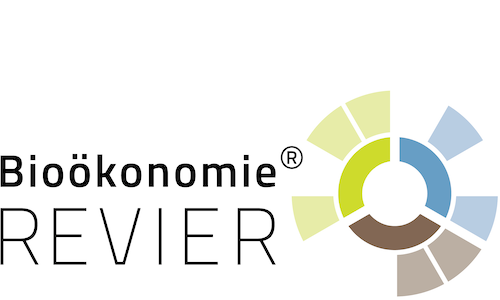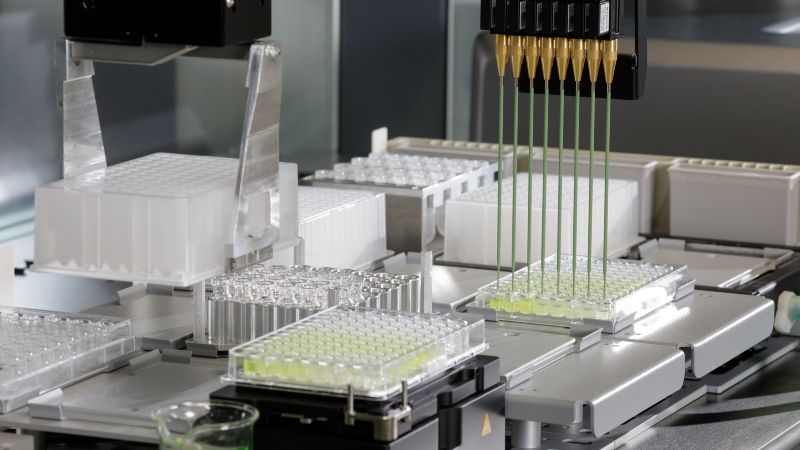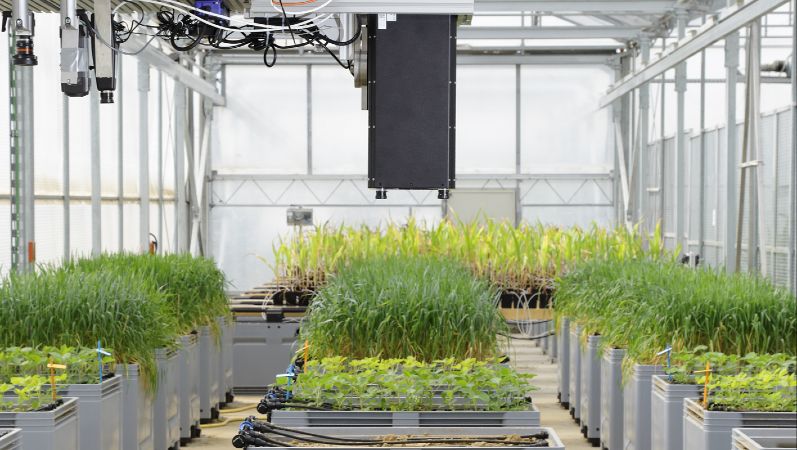Automatisierte Stamm- und Bioprozessentwicklung (AutoBioTech)
Maßgeschneiderte Mikroorganismen sind der Schlüssel zur industriellen Herstellung von wertvollen chemischen Molekülen aus nachwachsenden Rohstoffen. Die Forschung im Rheinischen Revier hat einen automatisierten Workflow entwickelt, der die bislang aufwendigen Prozesse zur Produktion robuster Hochleistungsstämme deutlich beschleunigt.
Das Innovationslabor AutoBioTech versteht sich als Technologieplattform für die Automatisierung und Digitalisierung der mikrobiellen Stamm- und Bioprozessentwicklung. Dem Team ist es gelungen, die Baupläne für komplexe Biosynthesen auf vergleichsweise einfache Weise in das stresstolerante Bakterium C. glutamicum einzuschleusen – ein exemplarischer Nachweis, wie sich in Zukunft alternative Produktionsverfahren auf Grundlage biogener Rohstoffe etablieren lassen.
© Youtube/ BioökonomieREVIER
Neueste Technologie in Nahaufnahme: AutoBiotech entwickelt automatisierte Workflows zur Produktion robuster Hochleistungsstämme.
Perspektiven für die Region
- Beschleunigung der Bioprozessentwicklung
- Gezielte Weiterentwicklung und Ausbau von Automatisierung und Digitalisierung im Bereich Biotechnologie
- Hoher Anreiz für die Ansiedlung und Gründung neuer Biotech-Firmen in der Region
Projektlaufzeit
1. Förderperiode: 01.12.2019 - 31.12.2021 (AutoBioTech)
2. Förderperiode: 01.01.2022 – 31.12.2026 (AutoBioTech)
Partner
Forschungszentrum Jülich GmbH, Institut für Biotechnologie (IBG-1): Prof. Dr. Michael Bott, Dr. Stephan Noack, Prof. Dr. Jan Marienhagen, Prof. Dr. Wolfgang Wiechert, Prof. Dr. Karl-Erich Jaeger, Prof Dr. Jörg Pietruszka
Veröffentlichungen
Rosch, T. M., Tenhaef, J., Stoltmann, T., Redeker, T., Kösters, D., Hollmann, N., Krumbach, K., Wiechert, W., Bott, M., Matamouros, S., Marienhagen, J., Noack, S. (2024). AutoBioTech ─ A Versatile Biofoundry for Automated Strain Engineering. ACS Synthetic Biology. https://doi.org/10.1021/acssynbio.4c00298
Orsi, E., Schada von Borzyskowski, L., Noack, S., Nikel, P. I., & Lindner, S. N. (2024). Automated in vivo enzyme engineering accelerates biocatalyst optimization. Nature Communications, 15(1), 3447. https://doi.org/10.1038/s41467-024-46574-4
Amariei, D.A., Tenhaef, J., Classen, T., David, B., Rosch, T.M., Gohlke, H., Noack, S., Pietruszka, J. (2024). Directed evolution of C-methyltransferase PsmD for enantioselective pyrroloindole derivative production. Catal. Sci. Technol. 14, 6298 – 6306 https://doi.org/10.1039/d4cy00657g
Nießer, J., Osthege, M., von Lieres, E., Wiechert, W., Noack, S. (2024) PeakPerformance - A tool for Bayesian inference-based fitting of LC-MS/MS peaks. JOSS 9(104) https://doi.org/10.21105/joss.07313
Diana Alexandra Amariei, Mona Haase, Moritz K. T. Klischan, Martin Wäscher, Joerg Pietruszka (2024). High-Throughput Colorimetric Detection and Quantification of Indoles and Pyrroloindoles for Enzymatic Activity Determination. ChemCatChem e202400052 https://doi.org/10.1002/cctc.202400052
Ravagnan, G., Lesemann, J., Müller, M. F., Poehlein, A., Daniel, R., Noack, S., Kabisch, J., Schmid, J. (2024). Genome reduction in Paenibacillus polymyxa DSM 365 for chassis development. Frontiers in Bioengineering and Biotechnology, 12, 1378873. https://doi.org/10.3389/fbioe.2024.1378873
Baumann, P. T., Dal Molin, M., Aring, H., Krumbach, K., Müller, M. F., Vroling, B., van Summeren-Wesenhagen, P., Noack, S., & Marienhagen, J. (2023). Beyond rational – biosensor-guided isolation of 100 independently evolved bacterial strain variants and comparative analysis of their genomes. BMC biology, 21(1), 183. https://doi.org/10.1186/s12915-023-01688-x
Berning, L., Lenz, T., Bergmann, A.K., Poschmann, G., Brass, H.U.C., Schlütermann, D., Friedrich, A., Mendiburo, M.J., David, C., Akgün, S., Pietruszka, J., Stühler, K., Stork, B. (2023). The Golgi stacking protein GRASP55 is targeted by the natural compound prodigiosin. Cell Communication and Signaling 21, 275. https://doi.org/10.1186/s12964-023-01275-1
Villa, C. A., Marienhagen, J., Noack, S., Wahl, S. A. (2023). Achieving net zero CO2 emission in the biobased production of reduced platform chemicals using defined co-feeding of methanol. Current Opinion in Biotechnology, 82, 102967 https://doi.org/10.1016/j.copbio.2023.102967
Halle, L., Hollmann, N., Tenhaef, N., Mbengi, L., Glitz, C., Wiechert, W., Polen, T., Baumgart, M., Bott, M., & Noack, S. (2023). Robotic workflows for automated long-term adaptive laboratory evolution: improving ethanol utilization by Corynebacterium glutamicum. Microbial Cell Factories, 22(1), 175. https://doi.org/10.1186/s12934-023-02180-5
Ramp, P., Mack, C., Wirtz, A., and Bott, M (2023). Alternative routes for production of the drug candidate D-chiro-inositol with Corynebacterium glutamicum using endogenous or promiscuous plant enzymes. Metabolic Engineering 78: 1-10 https://doi.org/10.1016/j.ymben.2023.04.013
Tenhaef, J., Halle, L., Müller, M.F., Tenhaef, N., Noack, S. (2022). Automatisierte Wege der mikrobiellen Stammentwicklung. BIOspektrum 28(4):436-439 https://doi.org/10.1007/s12268-022-1780-z
N. Tenhaef, R. Stella, J. Frunzke, S. Noack (2021). Automated Rational Strain Construction Based on High-Throughput Conjugation, ACS Synthetic Biology 10 (3), 589-599, https://pubs.acs.org/doi/10.1021/acssynbio.0c00599







